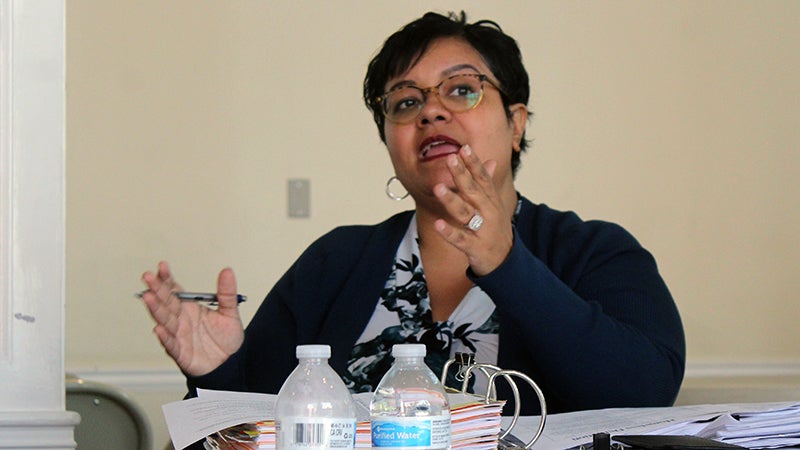ARCH, DCFRC collect $380K for assistance
Published 2:18 pm Thursday, December 19, 2019
Alabama Gov. Kay Ivey recently awarded $2.5 million in grant funding to help homeless Alabamians access immediate housing, as well help those in danger of becoming homeless.
The funding, which stems from the federal Emergency Solutions Grant (ESG) via funds provided by the U.S. Department of Housing and Urban Development (HUD), was awarded to 13 organizations and municipalities across the state to provide shelter, legal and health services, as well as financial education for families and individuals without steady housing.
“While many of us are looking forward to the holidays and spending time with friends and family, we should also remember that some of our fellow Alabamians are struggling to keep a rook over their heads and others do not have a place to call home at all,” Ivey said in a press release. “I am pleased to award these grants to provide needed assistance to many families at a critical time.”
Two organizations working in Dallas County received funding as a result of the grant, which will be administered by the Alabama Department of Econmic and Community Affairs (ADECA) – the Dallas County Family Resource Center (DCFRC) received $80,000 and the Alabama Rural Coaltion for the Homeless (ARCH), which partners with the DCFRC and serves well over half of the state’s 67 counties, received $300,000.
“These funds will allow us to address the homeless situation in Dallas County and provide shelter to those in need,” said DCFRC Executive Director James Thomas. “The homeless situation in Dallas County is less about people living on the street and more about those at risk of becoming homeless. While we do have many unsheltered homeless, we have a lot of individuals and families that will become homeless if they do not receive some assistance. These funds are a powerful weapon for the Dallas County Family Resource Center to fight generational poverty and homelessness.”
In the past, DCFRC has benefited from such funding, which is handed down every year, via its relationship with ARCH – this year marks the first time the group has received grant funding on its own.
For her part, ARCH Executive Director Felicia Jackson applauded the DCFRC for receiving grant funding this year, saying it speaks to how the group has “been able to develop and deliver clear outcomes for Dallas County in addressing local needs and priorities to end homelessness.”
“This grant could not have been awarded at a better time, nor to a better organization,” Jackson said, noting that there were 45 calls for assistance from the area last month, indicating that “the need in Selma is great.”
Thomas and Jackson not only deal with housing issues as part of their day jobs, the two have been a central part of the informal anti-poverty and homelessness working group that has been meeting for months under the leadership of Selma Center for Nonviolence, Truth and Reconciliation (SCNTR) Executive Director Ainka Jackson.
As such, the two are intimately acquainted with the biggest needs as it relates to homelessness and housing in the area – the two both agree that affordable housing is integral to addressing the problem.
“The housing must be affordable for the individuals we are moving in,” Thomas said. “If we move people into housing they cannot afford then they will become homeless again, so it is of paramount importance that we work collaboratively with local landlords and real estate companies to find affordable housing.”
“The biggest priority is to increase the availability of affordable housing,” Felicia Jackson said.
According to Thomas, the funding will be broken down across a variety of direct and indirect efforts.
“These funds and how they are allocated through outreach, prevention, rehousing and emergency shelter, will help provide an increased awareness and data regarding where the greatest need is among the homeless and at-risk of homelessness population,” Thomas said. “That awareness will create an opportunity for the larger community to increase coordination, initiate strategic partnerships and greater advocacy to help in the fight to end poverty and homelessness.”
Both organization leaders indicated that the working group will be involved in putting these funds to work across Dallas County.
“We certainly plan on openly collaborating with the homelessness working group to identify and alleviate the barriers that exist within the community,” Thomas said. “There are many underlying causes of homelessness and the working group can serve as a form of community board to offer up suggestions on dealing with those issues, as well as helping us to identify the resources that already exist within the community to meet those needs.”
Felicia Jackson agreed.
“The anti-poverty and homelessness working group…must be involved for this project to be successful,” Felicia Jackson said. “While they will not be able to dictate the terms of the grant and how it is administered, they will have a larger role in supporting [the DCFRC’s] efforts, by sharing what works and challenging each other to develop innovative and long-standing solutions to end poverty and homelessness in Selma.”
“This type of collaboration is what’s required to address such a systematic problem as homelessness and we encourage all of the community to work with us to provide a better quality of life for all citizens of Dallas County,” Thomas said.






